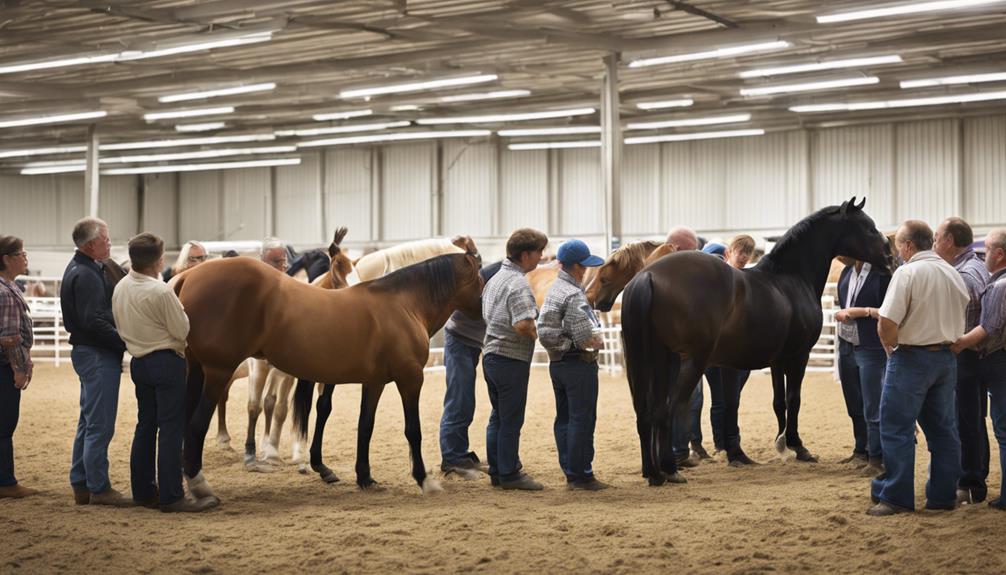Overcoming Obstacles in the Horse Breeding Business
Picture this: the vast, rolling pastures where majestic horses roam freely under the golden sun, embodying grace and power.
In the intricate world of horse breeding, challenges abound, from market demands to genetic complexities. Intriguingly, amidst these hurdles lie innovative solutions that promise to revolutionize the industry.
Stay tuned to discover the strategies and tactics that successful breeders employ to navigate these obstacles and thrive in the competitive landscape of horse breeding.
Market Demand Challenges
When breeding horses, you may encounter market demand challenges that require strategic planning and adaptability. In the equine industry, understanding the supply chain is crucial to meeting consumer preferences effectively. The supply chain in horse breeding involves various stages, from breeding and raising foals to training and selling horses. Each step must align with consumer preferences to meet market demands successfully.
Consumer preferences play a significant role in shaping market demand for horses. Factors such as breed, temperament, color, and discipline specialization influence buyers' decisions. To navigate market demand challenges, breeders must stay attuned to these preferences and adjust their breeding programs accordingly. For example, if there's a growing preference for certain bloodlines or performance traits, breeders should consider incorporating these elements into their breeding plans to meet market demands effectively.
Additionally, staying connected to trends in the equine industry can help breeders anticipate shifts in consumer preferences. By monitoring market demands and adjusting breeding strategies accordingly, breeders can position themselves to meet the evolving needs of buyers. Flexibility and innovation within the breeding process are key to overcoming market demand challenges and ensuring continued success in the horse breeding business.
Genetic Diversity Concerns
To address genetic diversity concerns in horse breeding, breeders must prioritize the preservation of diverse bloodlines and genetic traits to ensure the long-term health and resilience of the equine population. Implementing effective breeding strategies is crucial for maintaining genetic diversity within horse populations. By carefully selecting breeding pairs based on their genetic backgrounds, breeders can prevent inbreeding and promote a wider range of desirable traits.
Diversity management is key in tackling genetic diversity concerns. Breeders should aim to introduce new genetic material into their breeding programs regularly. This can be achieved through strategic outcrossing, where unrelated individuals are bred together to introduce new genetic variations. Additionally, breeders can collaborate with other breeders or organizations to exchange genetic material and broaden the gene pool.
Maintaining genetic diversity not only improves the overall health and vigor of horses but also enhances their adaptability to changing environmental conditions. By incorporating diverse bloodlines, breeders can reduce the risk of hereditary diseases and increase the overall resilience of the population. Ultimately, a well-managed genetic diversity program is essential for the long-term sustainability and success of horse breeding operations.
Reproductive Health Issues
In addressing reproductive health issues in horse breeding, you must prioritize proactive veterinary care and regular monitoring to ensure optimal breeding conditions. Maintaining the fertility and overall health of your horses is crucial for a successful breeding program. Here are some key points to consider:
- Fertility Management: Regularly assess the reproductive health of your horses through thorough examinations and testing. Establish a good relationship with a knowledgeable equine veterinarian who can provide guidance on fertility issues and help you develop a customized management plan.
- Breeding Techniques: Stay informed about the latest advancements in breeding techniques to maximize success rates. Consider techniques such as artificial insemination or embryo transfer to overcome potential reproductive challenges.
- Nutritional Support: Ensure your horses receive a well-balanced diet rich in essential nutrients to support their reproductive health. Consult with an equine nutritionist to create a diet plan tailored to meet the specific needs of breeding horses.
- Environmental Factors: Create a breeding environment that promotes reproductive success. Pay attention to factors such as stable conditions, pasture quality, and overall horse well-being to minimize stress and optimize breeding outcomes.
Regulatory Compliance Hurdles
Navigating regulatory compliance hurdles in horse breeding requires meticulous attention to detail and adherence to industry standards to ensure the legality and ethicality of your breeding practices. Staying up to date with compliance training and regulatory updates is crucial to avoid potential legal issues and ensure that your breeding operations are conducted ethically.
Compliance training is essential for you and your staff to understand the laws and regulations that govern horse breeding. By investing time and resources into proper training, you can mitigate the risk of non-compliance and protect the welfare of your horses. Regular training sessions help reinforce the importance of following protocols and procedures to maintain compliance with industry standards.
Keeping abreast of regulatory updates is equally vital in navigating compliance hurdles. Regulations in the horse breeding industry can change frequently, requiring you to stay informed and adapt your practices accordingly. Subscribing to industry newsletters, attending conferences, and networking with other breeders can help you stay ahead of regulatory changes and adjust your breeding practices proactively.
Economic Sustainability Struggles
Staying financially viable in the horse breeding industry can present significant challenges, especially when faced with Economic Sustainability Struggles after addressing Regulatory Compliance Hurdles. To overcome these obstacles and ensure the economic sustainability of your breeding business, it's crucial to focus on effective financial management and strategic resource allocation.
Here are some key points to consider:
- Budget Wisely: Create a detailed budget that accounts for all expenses related to horse breeding, including feed, veterinary care, breeding equipment, and staff wages. Monitor your budget closely and make adjustments as needed to avoid overspending.
- Diversify Revenue Streams: Explore different avenues to generate income from your breeding operation, such as offering training services, selling horse-related products, or hosting events. Diversifying your revenue streams can help stabilize your cash flow and mitigate financial risks.
- Prioritize High-Value Breeding: Allocate your resources towards breeding high-quality horses that have a strong market demand. By focusing on producing top-tier offspring, you can command higher prices and maximize your returns on investment.
- Seek Professional Financial Advice: Consider consulting with a financial advisor who's experience in the horse breeding industry. They can provide valuable insights and help you develop a sustainable financial strategy to grow your business effectively.
Technology Adoption Barriers
Confronted with Technology Adoption Barriers, horse breeders must assess their current practices to identify areas where technological integration can enhance efficiency and productivity. Embracing digital tools can revolutionize the way breeding operations are managed. However, barriers such as the initial cost of technology implementation, lack of knowledge or training, and resistance to change can impede progress in this area.
Digital tools offer a wide range of benefits to horse breeders. They can streamline data management processes by centralizing information related to breeding records, genetic profiles, and health histories. This not only saves time but also reduces the likelihood of errors that may occur with manual record-keeping. Moreover, digital tools can provide valuable insights through data analysis, helping breeders make more informed decisions to improve breeding outcomes.
Overcoming these barriers requires a proactive approach. Horse breeders should invest in training programs to familiarize themselves and their staff with the latest technologies. Additionally, seeking guidance from industry experts or consultants can help navigate the complexities of technology integration. By gradually incorporating digital tools into daily operations and demonstrating their benefits, resistance to change can be minimized.
Competition in Breeding Programs

To excel in the competitive landscape of breeding programs, you must strategically position your operation and differentiate your offerings to stand out among other breeders. In a world where numerous breeders are vying for the top spot, it's crucial to implement the right strategies to stay ahead. Here's how you can navigate the competition successfully:
Strategies to Succeed in Breeding Programs:
- Master Breeding Techniques: Stay updated with the latest advancements in breeding techniques to ensure the highest success rates in producing top-quality foals.
- Impeccable Stud Selection: Choose your studs wisely, focusing on not just their pedigree but also their performance records and genetic strengths to enhance your breeding program's reputation.
- Build a Strong Network: Establish connections within the breeding community to exchange knowledge, share experiences, and potentially collaborate on breeding projects for mutual benefits.
- Market Your Unique Selling Points: Highlight what sets your breeding program apart, whether it's superior bloodlines, exceptional care standards, or innovative breeding practices, to attract discerning clients.
Environmental Factors Impact
Considering the influence of environmental factors on horse breeding outcomes is essential for optimizing success in your breeding program. Climate variations play a significant role in determining the health and reproductive capabilities of your horses. Extreme temperatures or unpredictable weather patterns can stress the animals, affecting fertility rates and overall well-being. To mitigate these challenges, it's crucial to provide adequate shelter, access to clean water, and proper ventilation in your breeding facilities.
Pasture management is another critical aspect impacted by environmental factors. The quality of the grazing land directly affects the nutrition intake of your horses, which, in turn, influences their reproductive health. Ensure that your pastures are well-maintained, properly fertilized, and free from harmful plants. Regularly rotating pastures can prevent overgrazing and allow for regrowth, providing a sustainable source of nutrition for your breeding stock.
Frequently Asked Questions
How Can I Effectively Market My Horse Breeding Business to Attract New Customers?
To effectively market your horse breeding business and attract new customers, utilize social media and targeted advertising. Engage with potential clients through interactive posts and stories.
Organize events like open houses to showcase your facilities and horses. Create a strong online presence that highlights your expertise and the quality of your services.
What Are Some Innovative Ways to Increase Genetic Diversity Within My Breeding Program?
To boost genetic diversity within your program, consider exploring innovative breeding techniques and enhancing genetic selection. By introducing new bloodlines and carefully selecting mating pairs, you can broaden the genetic pool and produce healthier, more resilient offspring.
Embrace modern technologies like artificial insemination or embryo transfer to diversify your breeding program effectively. By continuously evolving your approach to genetic selection, you can stay ahead in the competitive horse breeding business.
Are There Any Specific Reproductive Health Issues That Are Common in the Horse Breeding Industry and How Can They Be Prevented?
When breeding horses, reproductive challenges like infertility, uterine infections, and low conception rates can arise. To prevent these issues, maintaining proper hygiene in breeding practices, regular veterinary check-ups, and monitoring hormonal levels are crucial.
Implementing a well-rounded vaccination program, proper nutrition, and stress reduction techniques can also contribute to preventing common health issues in the horse breeding industry.
Stay proactive to ensure the health and success of your breeding program.
What Are the Key Regulatory Compliance Hurdles That Horse Breeders Need to Be Aware of and How Can They Navigate Them Successfully?
When navigating regulations in the horse breeding industry, compliance challenges can arise due to breeding standards and legislative updates. To succeed, stay informed about changing laws, seek guidance from industry experts, and maintain detailed records.
How Can I Improve the Economic Sustainability of My Horse Breeding Business in the Face of Rising Costs and Fluctuating Market Demand?
To improve the economic sustainability of your horse breeding business, focus on financial strategies and cost management. Explore innovative breeding techniques that enhance quality and reduce expenses.
Stay informed about market trends to adapt your breeding program accordingly. By balancing smart financial decisions with effective breeding practices, you can navigate rising costs and fluctuating market demand to ensure the long-term success of your business.
Conclusion
In the horse breeding business, you face numerous obstacles, from market demand challenges to genetic diversity concerns. However, by overcoming these hurdles with determination and innovative solutions, you can thrive in this competitive industry.
Stay informed about regulatory compliance, prioritize reproductive health, and embrace technology to improve breeding programs. With perseverance and a strategic approach, you can navigate these challenges and achieve economic sustainability in the horse breeding business.
